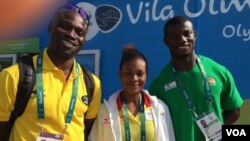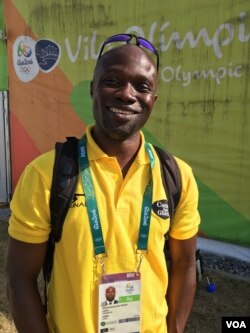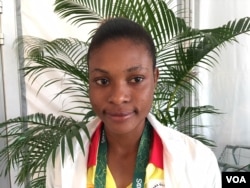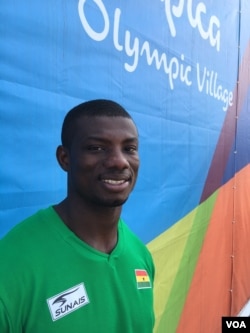Look at the roster of track-and-field athletes at Middle Tennessee State University in Murfreesboro, a suburb of Nashville in the southern United States, and you will notice there are more Africans than Americans.
They come from Ghana, Kenya, Nigeria and Uganda. Middle Tennessee assistant coach Andrew Owusu, who is from Ghana, credits legendary head coach Dean Hayes for the diverse body of student athletes.
“Coach Hayes actually has a long history of recruiting international athletes," Owusu says with a smile, so Middle Tennessee's sports teams are a mix of American and foreign athletes.
The 44-year-old assistant coach, a former triple jumper and long jumper, represented Ghana in both the 1996 and 2000 Olympics. He's now coaching two Ghanaians from Middle Tennessee at the Rio Olympics, as one of three coaches for the Ghana Olympic track-and-field team.
Owusu told VOA he thought Hayes, now 77 and in his 51st year at the university, recruited his first Ghanaian athlete in the mid-1970s. His recruitment of Africans has not let up.
'We care about them'
“I've had a little bit of criticism, from folks saying, 'Oh, why Middle Tennessee?' ... And I say, 'Well, because we care about them.' We care about them beyond sports," Owusu said.
The two Middle Tennessee athletes at the Rio Olympics are Janet Amponsah, 23, a junior, and John Ampomah, 26, a graduating senior.
Amponsah ran in the women's 200 meters Monday and was disappointed with her performance, but Owusu told her that his first Olympic experience did not go well, either. And fortunately, she will get a chance to do better Thursday, when she runs with Ghana's 4x100-meter relay team, which is ranked among the top eight women's squads in Rio.
Just being at the Olympics is special, Amponsah told VOA: “It's a very big achievement for me, because it's not everybody in the world who has the opportunity to be here. So even if you come here and didn't achieve what you wanted to do, it gives you a chance to have the experience.”
Teammate Ampomah will compete in the men's javelin Wednesday night. His ascension in the sport for Ghana has been remarkable. While in high school he picked up a javelin for the first time, just for fun. Then he threw it farther than the school champion, so he was invited onto the team.
At the 2012 African Championships, he threw 57 meters. Now, four years later, he is the Ghanaian record-holder at 83.09 meters and was the silver medalist at last year's All Africa Games with a throw of 82.96 meters. The winning throw at the 2012 London Olympics was 84.58 meters (by Keshorn Walcott of Trinidad and Tobago).
Greater aspirations
Ampomah told VOA he was proud of the great strides he has made, but he's also eager to get his career to the next level.
“Sometimes I get disappointed, but when I look back on the last four years and distances that I'm throwing, even though I haven't won any international medals or big championships yet, if I give myself another four or five more years, I have a long way to go,” he said. “And sometimes the game is not all about winning, you know, because not everybody can win. But it's about being there and giving your best all the time.”
Both Ampomah and Amponsah expressed their appreciation for being able to get a good education in the United States while pursuing their athletic careers.
“At home [in Ghana] we used to not get a lot of competition,” said Amponsah, “And when I got to the United States, I made a lot of improvement, both in my academic and sports career.”
They both credit Ghana Athletics Association President Francis Dodoo with helping them get scholarships to study in the U.S.
“They wanted to make sure we didn't just perform for the country, but we have to have a career that will take us through the rest of our lives,” said Ampomah. “And I think that's the smartest thing I've ever seen our association doing for young kids like us.”
Learned from Hayes
Ampomah majored in criminal justice and also studied coaching, because he hopes to help other aspiring Ghanaian athletes. He is the captain of Ghana's athletics team in Rio.
He said he learned a lot from Hayes while at Middle Tennessee State, just as other international students before him did.
“He's coached a lot of Ghana athletes and I know where he took them, and with his experience I knew what he could do to help me,” Ampomah said. “I know what he did for them. I know they became great. They became Olympians, and I knew if I went there, I could also become an Olympian.”
Amponsah added that Hayes and his entire staff, including Owusu, made them feel like family.
“The coaches are so nice to the athletes, so whenever I go back home [to Ghana], I talk to other top athletes and suggest they come," she said. "Hayes is a father to us. That's why I would say a lot of Africans are there.”







